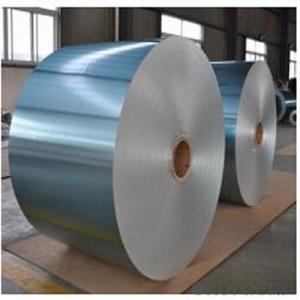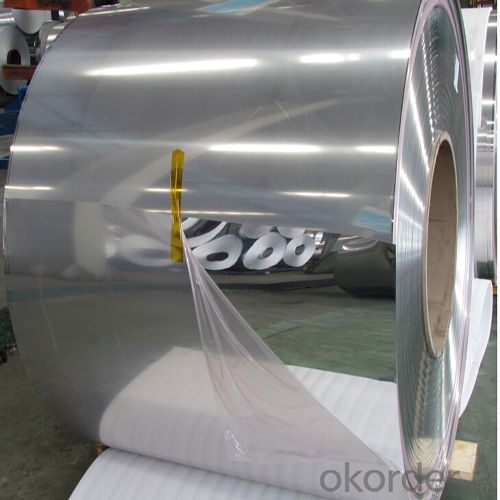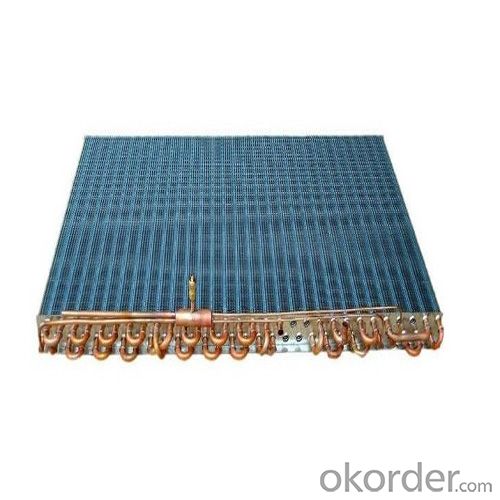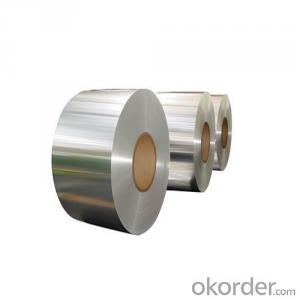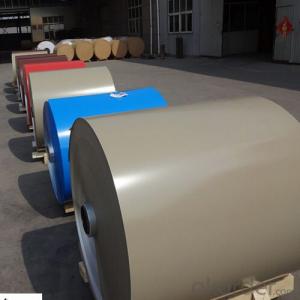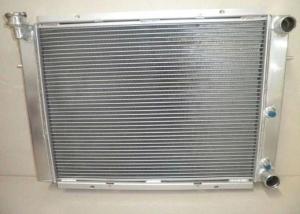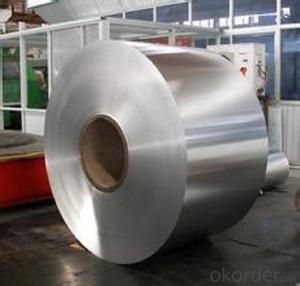Rheem Aluminum Coils - Aluminum Radiator Heating Fins Coil with Best Price
- Loading Port:
- Shanghai
- Payment Terms:
- TT OR LC
- Min Order Qty:
- 5 m.t.
- Supply Capability:
- 10000 m.t./month
OKorder Service Pledge
OKorder Financial Service
You Might Also Like
Specification
1.Structure of Aluminum Radiator Heating Fins Coil Description:
Alloy Aluminium Plate 1200 is widely used in the strength requirements of the product. Products commonly used in signs, billboards, building exterior decoration, bus body, high factory wall decoration, kitchen sink, lamp, fan, electronic components, chemical apparatus, sheet processing, deep drawing or spinning hollow ware, welding parts, heat exchangers, Bell surface and plate, plates, kitchen utensils, accessories, safety equipment and other.
2.Main Features of Aluminum Radiator Heating Fins Coil:
PVC Protect Film
Waterproof paper
High Quality
Competitive Price
3. Aluminum Radiator Heating Fins Coil Images:
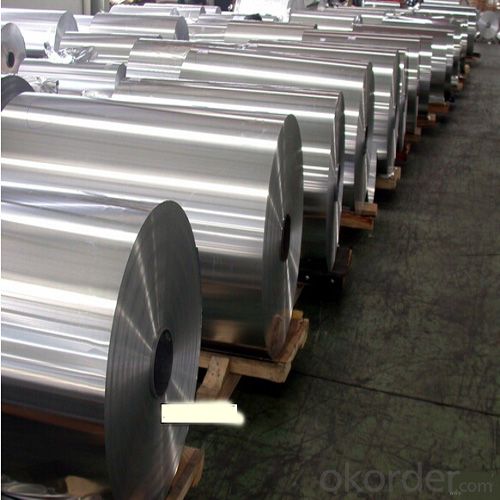
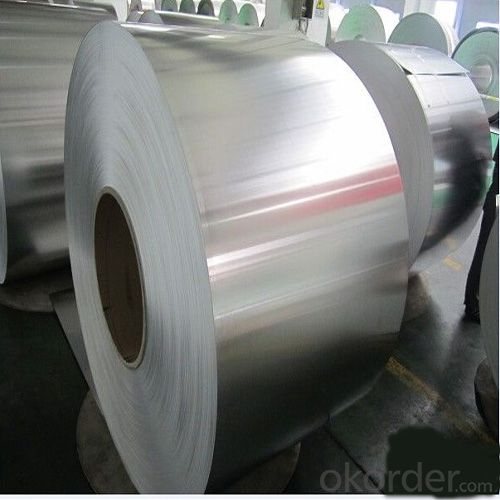
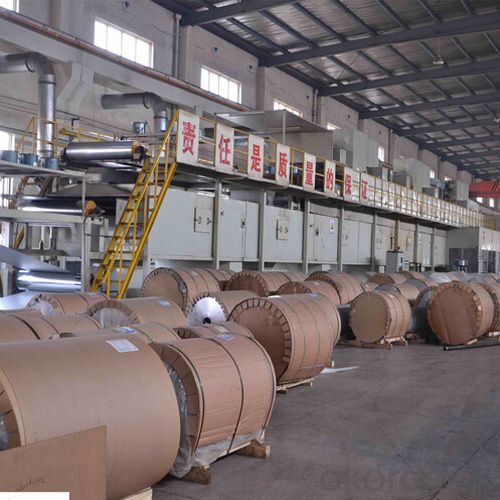
4. Aluminum Radiator Heating Fins Coil Specification:
Product | Code(typical examples) | Spec. mm | Main application | |
Fin stock H16&H14 | Bare fin stock | 3003+1.5%Zn,3003+1.5%Zn+Zr | Thickness: 0.05~0.35mm Width(min):10mm | Auto&Electric RAD. Fins |
Cladding fin stock | core:3003+1.5%Zn Cladding layer(2):4343 | |||
Tube Material (usually H16, H14&H26,H24) | Non-clad tube | 3003 | Thickness:0.2~0.5mm Width:26~200mm | Tube material applied in Auto thermal transfer parts |
Cladding tube material | core:3003 Layer 1(brazing layer):4343 Layer 2(water side):7072 | |||
Header plate,side plate (Temper-O ) | Cladding material | core:3003 Layer 1:4343 Layer 2:4343 | Thickness:1.0~2.5 Width:30~1400 Length:1000~6000 | Auto RAD. header&side platematerial |
Non-clad material | Non-clad 3003 | |||
Collecting tube material (H14 as usual) | core:3003 Cladding layer:4045(single side) | Thickness:1.0~2.0 | Collecting tube of Auto air- conditioner | |
Evaporator tube plate | core:3003 Cladding layer 1: 4343 Cladding layer 2: 4343 | Thickness:0.4~0.6 Width:30~1400 | Laminated evaporator | |
5.FAQ
Q1.How long have you been in this product?
A1:More than 10 years.
Q2. What's the minium quantity(MOQ)?
A2. 5 Metric tons
Q3. How long is shipping time?
A3. 7 (ready-made products)-25 days(OEM)
Q4. How do you guarantee the quality?
A4. 1. Cooperating and Exchaning experience with sevral quoted aluminum companies
2. Japanese and Swiss production line and skilled works (regular training and testing)
3. more than 10 years production experience.
Q5. Do you have after sale service?
A5. Yes. Any quality problem occurs within one year, pls take photoes,we will be responsible.
- Q: What is the shelf life of aluminum coils?
- The shelf life of aluminum coils can vary depending on various factors such as storage conditions, handling, and the specific alloy used. Generally, aluminum coils can have a shelf life of several years if stored properly. It is recommended to store them in a dry and clean environment, away from moisture, extreme temperatures, and corrosive substances. Additionally, handling should be done with care to prevent any damage or contamination that may reduce the shelf life. Regular inspection and maintenance are also important to ensure the integrity and longevity of aluminum coils. Ultimately, consulting the manufacturer's guidelines or contacting a professional in the industry can provide more accurate information on the specific shelf life of aluminum coils.
- Q: How to sell the super hard 5083aluminum alloy and 5083 aluminum coil?
- Among the alloy which cannot endure heat treatment, 5083 aluminum alloy, a kind of high magnesium alloy, has the properties of intensity, machinability, anti-corrosion, electric-arc weldability and aesthetic after anodizing. The main element of 5083 alloy being magnesium, it is endowed with corrosion resistance, weldablility and moderate intensity, thus applicable to maritime areas such as ships, and cars, airplane weldments, metro light rail, and pressure vessel (such as liquid tank truck, refrigerated truck, refrigerated container), refrigerating equipment, television tower, drilling equipment, transport facility, missile parts, armor and so on.
- Q: What happened to the aluminum coil coming out of the annealing furnace?
- There is oil on the aluminum coil and the annealing time is too long.
- Q: What is the cost of aluminum coils?
- The cost of aluminum coils can vary depending on various factors such as the thickness, width, and length of the coil, as well as the market conditions and the supplier. Generally, the price of aluminum coils is determined by the current market price of aluminum, which is influenced by factors like supply and demand, production costs, and global economic conditions. It is advisable to contact suppliers or check online platforms to get accurate and up-to-date pricing information for aluminum coils.
- Q: What is the composition of aluminum coils?
- Pure aluminum coils typically contain 99.5% aluminum and trace amounts of other elements. Conversely, aluminum alloys are formed by blending aluminum with metals like copper, magnesium, manganese, or zinc. These alloys are specifically engineered to bolster the strength, corrosion resistance, and other desired characteristics of the aluminum coils. The precise composition of the coils may differ based on the particular application and requirements, but in general, they contain a significant proportion of aluminum along with small quantities of other elements to yield a sturdier and more effective product.
- Q: What specific conditions or criteria must be met when utilizing aluminum coils in construction projects?
- <p>Yes, there are special requirements for using aluminum coils in construction. These include adherence to specific industry standards for material strength and durability, such as ASTM or ISO specifications. It's crucial to ensure that the aluminum coils have the appropriate thickness and width to withstand the structural loads. Corrosion resistance is also a key factor, as aluminum is prone to oxidation. Protective coatings or treatments may be necessary. Additionally, the coils must be compatible with other construction materials and should be tested for their performance under various environmental conditions. Compliance with building codes and safety regulations is mandatory to avoid any structural or safety issues.</p>
- Q: What are the common surface protection methods for aluminum coils?
- Various industries widely use several common methods for protecting the surface of aluminum coils. These methods aim to ensure the long-term durability and performance of the coils by preventing corrosion and other types of damage. Anodizing is one of the most common surface protection methods for aluminum coils. It involves immersing the coil in an electrolyte bath and applying an electric current to create a protective oxide layer on the surface. This oxide layer not only improves the appearance of the coil but also enhances its resistance to corrosion, scratching, and wear. Coating is another popular method for protecting the surface of aluminum coils. It involves applying a layer of paint or coating material onto the coil's surface. Coatings can be applied using various techniques, such as electrostatic spraying, roll coating, or coil coating. These coatings act as a barrier between the aluminum surface and external elements, safeguarding it from moisture, UV radiation, and other environmental factors that can cause corrosion and damage. Protective films also offer a way to protect aluminum coils. These films, typically made from polyethylene or similar materials, are applied as a temporary protective layer. They help prevent scratches, abrasions, and other types of damage during transportation, storage, and installation. When it's time to use the aluminum coil, the protective film can be easily peeled off, leaving behind a clean and undamaged surface. Proper storage and handling practices are also crucial for protecting aluminum coils. Storing the coils in a dry, clean, and well-ventilated area, away from corrosive substances, can significantly extend their lifespan. Additionally, handling the coils with care and using appropriate lifting and transportation equipment can prevent physical damage that could compromise their integrity. In conclusion, the common methods for protecting the surface of aluminum coils include anodizing, coating, the use of protective films, as well as proper storage and handling practices. By employing these methods, aluminum coils can be effectively safeguarded against corrosion, scratching, and other forms of damage, ensuring optimal performance and longevity.
- Q: Describe the various uses of aluminum coils in the manufacturing industry.
- <p>Aluminum coils are widely used in manufacturing due to their lightweight, corrosion resistance, and strength. They are utilized in the production of various products such as automotive parts, aerospace components, and construction materials. Aluminum coils are also employed in the manufacturing of electrical wiring, heat exchangers, and packaging materials. Additionally, they are used in the production of cans and foils for food and beverage industries. Their versatility makes aluminum coils an essential material in many manufacturing processes.</p>
- Q: This question asks for a brief explanation of the process involved in the manufacturing of aluminum coils.
- <p>Aluminum coil is made through a series of processes starting with the melting of aluminum ingots or scrap. The molten aluminum is then poured into a casting machine where it's cooled and solidified into large slabs. These slabs are then heated and passed through a series of rolling mills to reduce their thickness and achieve the desired coil gauge. The rolling process is often hot or cold, depending on the final application of the coil. After rolling, the aluminum is coiled into rolls and may undergo additional treatments like annealing to improve its properties. Finally, the aluminum coil is cleaned, inspected, and shipped for use in various industries such as construction, automotive, and packaging.</p>
- Q: What is the purpose of an aluminum coil and what are its applications?
- <p>An aluminum coil is a versatile material that serves various functions. It is used in numerous applications due to its lightweight, corrosion resistance, and high thermal and electrical conductivity. Common uses include manufacturing heat exchangers, transformers, and electrical wiring. Aluminum coils are also utilized in the construction of automotive parts, aerospace components, and in the packaging industry for cans and foils. Additionally, they are employed in the HVAC industry for air conditioning and heating systems, and in the production of various consumer goods.</p>
Send your message to us
Rheem Aluminum Coils - Aluminum Radiator Heating Fins Coil with Best Price
- Loading Port:
- Shanghai
- Payment Terms:
- TT OR LC
- Min Order Qty:
- 5 m.t.
- Supply Capability:
- 10000 m.t./month
OKorder Service Pledge
OKorder Financial Service
Similar products
Hot products
Hot Searches
Related keywords
